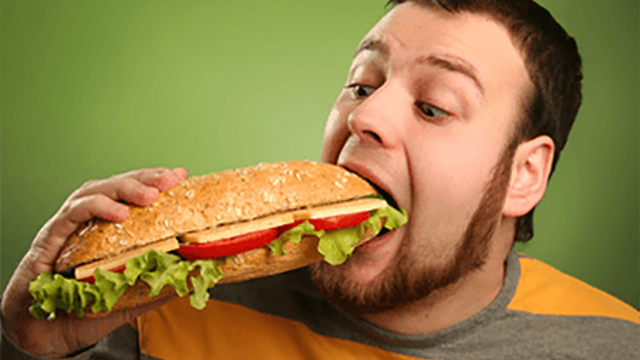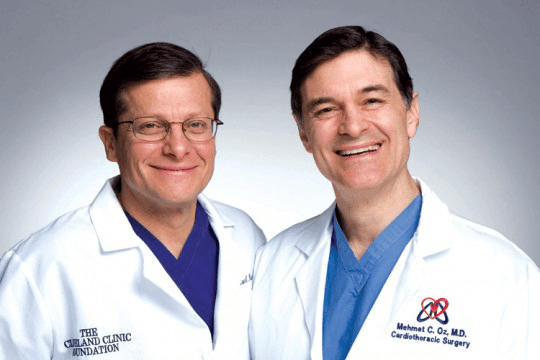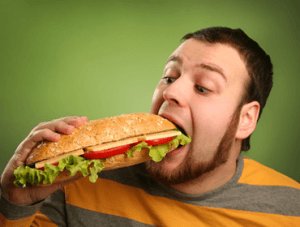
The media’s buzzing about food addiction: out-of-control eating that hooks your brain, almost like tobacco or street drugs. Take a look at Daymon Patterson, the self-promoting fast-food addict on YouTube (Dr. Oz has offered him drive-thru diet tips!) and a recent pronouncement from U.S. Secretary of Health Kathleen Sebelius that obesity can be “an addiction.”
Clearly, for many of you, food is more than a way to fuel your body; it’s something you crave for the feeling it gives you – while you’re eating it. Later, it doesn’t feel so good. Just like any addictive substance.

What foods feed the urge to splurge? The culprits are salt, sweets and saturated-fat-laden ingredients, especially common as a terrible-for-you threesome in processed foods. These ingredients typically unleash waves of opium-like brain chemicals that trigger a temporary feeling of contentment. But it backfires: Eating terrible-for-your-health foods amps up inflammation that stresses your body and brain. That makes you want to eat more terrible-for-your-health foods so you’ll feel better (temporarily). You’re on a hamster wheel to nowhere good. Get the picture?
If you’re worried that food has become an obsession for you, answer these questions. Any three “yes” answers out of five indicates that you may have a problem. (Luckily, we have the solutions; just read on!)
1. Do you hide food in your home, car or office?
2. Do you find that there are times when you can’t stop thinking about food?
3. Do you turn to food after an argument with a spouse, relative or friend?
4. Do you feel shaky, sweaty and dizzy if you don’t have your favorite food for a day or more?
5. Do you find you can’t stop eating, even when you’re not hungry?
 Ready for recovery? Conquering a food addiction can help you grow years younger, as you lose weight and improve your health (blood pressure and bad LDL cholesterol will fall; so will your risk for Alzheimer’s disease, heart attacks, diabetes, impotence, wrinkles and even cancer). Start with these steps:
Ready for recovery? Conquering a food addiction can help you grow years younger, as you lose weight and improve your health (blood pressure and bad LDL cholesterol will fall; so will your risk for Alzheimer’s disease, heart attacks, diabetes, impotence, wrinkles and even cancer). Start with these steps:
Identify your trigger foods. Write down what you eat, how you were feeling at the time and what was happening in your life. In the course of a week or two, you’ll discover which situations trigger cravings for j-u-n-k that plays your brain like a pinball wizard at an arcade. Then, make a list of the foods you eat compulsively.
Show trigger foods the door. Start slowly: Eliminate one favorite processed or fast food. They contain added sugars, syrups, trans fats, high levels of saturated fat, refined (white) flour and grains that aren’t 100 percent whole. At the same time, add one good-for-you piece of lean protein, a veggie or a fruit to your plate in place of the culprit. After you’ve gone a week without it, eliminate another. Week after week, kick out the bad guys and add in the good guys.
Got a craving? Think F-L-A-B. Are you Frustrated? Lonely? Anxious or Bored? These are big emotional motivations for obsessive munching. If any of those words describes you, when you get the urge to indulge, do something else to satisfy your real need. Call a friend, take a short walk, close your eyes and breathe deeply, crack open a good book. Stick with it, and you’ll break the connection between these feelings and cupcakes, mac’n cheese or chocolate.
Pamper your brain with sleep and exercise. Walking, dancing, sweeping – almost any kind of movement triggers the release of feel-good brain chemicals for a natural high. Treat yourself to seven to eight great hours of slumber, too, so you don’t have to hunt for energy at the bottom of a candy bag.
Find support. Recovery’s easier when you don’t go it alone. Addictions thrive in the shadows. Get support from family and friends. Or turn to a group like Food Addicts Anonymous, which hosts in-person and phone meetings across the U.S. and Canada with people who know exactly what you’re going through.
– Dr. Michael Roizen and Dr. Mehmet Oz
© 2012 Michael Roizen, M.D. and Mehmet Oz, M.D. Distributed by King Features Syndicate, Inc.

